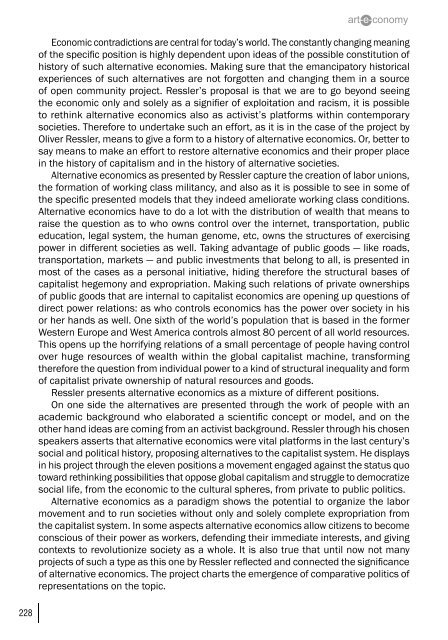art-e-conomy _ reader - marko stamenkovic
art-e-conomy _ reader - marko stamenkovic
art-e-conomy _ reader - marko stamenkovic
Create successful ePaper yourself
Turn your PDF publications into a flip-book with our unique Google optimized e-Paper software.
228<br />
Economic contradictions are central for today’s world. The constantly changing meaning<br />
of the specific position is highly dependent upon ideas of the possible constitution of<br />
history of such alternative economies. Making sure that the emancipatory historical<br />
experiences of such alternatives are not forgotten and changing them in a source<br />
of open community project. Ressler’s proposal is that we are to go beyond seeing<br />
the economic only and solely as a signifier of exploitation and racism, it is possible<br />
to rethink alternative economics also as activist’s platforms within contemporary<br />
societies. Therefore to undertake such an effort, as it is in the case of the project by<br />
Oliver Ressler, means to give a form to a history of alternative economics. Or, better to<br />
say means to make an effort to restore alternative economics and their proper place<br />
in the history of capitalism and in the history of alternative societies.<br />
Alternative economics as presented by Ressler capture the creation of labor unions,<br />
the formation of working class militancy, and also as it is possible to see in some of<br />
the specific presented models that they indeed ameliorate working class conditions.<br />
Alternative economics have to do a lot with the distribution of wealth that means to<br />
raise the question as to who owns control over the internet, transportation, public<br />
education, legal system, the human genome, etc, owns the structures of exercising<br />
power in different societies as well. Taking advantage of public goods — like roads,<br />
transportation, markets — and public investments that belong to all, is presented in<br />
most of the cases as a personal initiative, hiding therefore the structural bases of<br />
capitalist hegemony and expropriation. Making such relations of private ownerships<br />
of public goods that are internal to capitalist economics are opening up questions of<br />
direct power relations: as who controls economics has the power over society in his<br />
or her hands as well. One sixth of the world’s population that is based in the former<br />
Western Europe and West America controls almost 80 percent of all world resources.<br />
This opens up the horrifying relations of a small percentage of people having control<br />
over huge resources of wealth within the global capitalist machine, transforming<br />
therefore the question from individual power to a kind of structural inequality and form<br />
of capitalist private ownership of natural resources and goods.<br />
Ressler presents alternative economics as a mixture of different positions.<br />
On one side the alternatives are presented through the work of people with an<br />
academic background who elaborated a scientific concept or model, and on the<br />
other hand ideas are coming from an activist background. Ressler through his chosen<br />
speakers asserts that alternative economics were vital platforms in the last century’s<br />
social and political history, proposing alternatives to the capitalist system. He displays<br />
in his project through the eleven positions a movement engaged against the status quo<br />
toward rethinking possibilities that oppose global capitalism and struggle to democratize<br />
social life, from the economic to the cultural spheres, from private to public politics.<br />
Alternative economics as a paradigm shows the potential to organize the labor<br />
movement and to run societies without only and solely complete expropriation from<br />
the capitalist system. In some aspects alternative economics allow citizens to become<br />
conscious of their power as workers, defending their immediate interests, and giving<br />
contexts to revolutionize society as a whole. It is also true that until now not many<br />
projects of such a type as this one by Ressler reflected and connected the significance<br />
of alternative economics. The project ch<strong>art</strong>s the emergence of comparative politics of<br />
representations on the topic.


